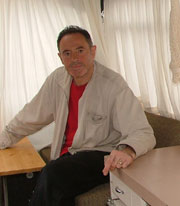
Nick Rosen in his research RV
Thousands of people are choosing to live in homes without mains electricity, gas or water. Are these the eco-townies of the future? The Guardian newspaper today features Nick Rosen’s call for changes to the law to encourage off-grid living. Here is the article in full.
I reckon there are 75,000 people living in nearly 25,000 off-grid homes in the UK. These are homes not connected to mains gas and electricity, water and sewage or even the phone lines that bind the rest of us into a system that wastes energy transporting it around the country, and loses up to 30% of water through leaks.
To get some idea of how many are living this way, I travelled round the UK for most of last year researching a book, How To Live Off-Grid. I met some of the thousands of normal families living this way, in everything from brick houses to yurts.
Roy and June Fountain, in Kirkby Malzeard, north Yorkshire, live comfortably and conventionally in a normal looking house that gets its water from a borehole and its electricity from a wind turbine. Roy Fountain is a retired farmer, not an environmentalist, who bought a derelict cottage and moved his family into it. He battled for years for planning permission to live this way, and succeeded only by starting a sheep-milking business, which was not his original intention, but it was the only way he could persuade the local council that he had a legitimate reason for living off-grid.
He is in a minority among the off-gridders. Most of the ingenious, self-reliant people who live this way have built their own wooden cabins in fields or parked their caravans behind hedgerows; driven camper vans or converted lorries deep into woodlands; live aboard boats, many of them moored on inner-city canals; or, in the most extreme cases, inhabit tree houses and benders erected in woods and fields.
Benders are shelters made from saplings bent into a lattice frame, supporting a canvas roof and walls. There were more than 10,000 recorded in the 1815 census, and now they are making something of a comeback. The rest of us can learn from these ecological footsoldiers about how to live low-energy, low-impact, low-carbon lives.
Perhaps the nation’s off-grid housing stock can be classed as an investment in a carbon-free future. Every off-gridder automatically reduces their energy and water consumption by up to 90% compared with a typical household. They live each day aware of the sun and the wind – dependent on the elements, and so closer to them.
The figure of 75,000 is only those living off-grid all year round. It does not include part-time off-gridders – the winter renters who go out in their vans or take to their yurts and caravans. This triples the winter numbers.
But why does any of this matter, other than to the people who live this way? Because off-grid living could help the government meet two of its key aims: more affordable homes, and lower domestic carbon consumption.
Despite all the government’s talk of affordable housing and eco-towns, it is well nigh impossible to get planning permission anywhere that is truly affordable. The prime minister’s pledge to build five eco-towns is all very well, but to be truly sustainable, shouldn’t they start as eco-villages and grow organically? They need to be populated by people who have the desire and knowhow to live sustainably. Where is Gordon Brown planning to find these paragons other than from among the current off-grid population?
On this crowded island, it is the building land that makes homes unaffordable, not the house itself. Anyone can buy a few acres of woodland or meadow for perhaps
Auto Amazon Links: No products found.
